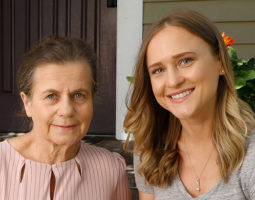Alumni Spotlight
The Feldsher’s Daughter
A physician assistant follows in her mother’s footsteps.
 Growing up in Ukraine, Iryna Kylyukh, PA-C (MEDEX Seattle Class 50) remembers that her mother never hid her work from her seven children.
Growing up in Ukraine, Iryna Kylyukh, PA-C (MEDEX Seattle Class 50) remembers that her mother never hid her work from her seven children.
“I remember her telling us all these stories,” says Kylyukh. “She was in an ambulance car — just like a paramedic — but it was just her and her driver. She would deliver babies in that car.”
Iryna’s mother, Lyudmila Kylyukh, was the field medic or feldsher for the neighboring 10 villages. If there were a need for urgent medical care, Lyudmila would get the call.
“Everyone knew her. She was the feldsher lady,” says Kylyukh.
A big transition
Her family immigrated to the U.S. in search of a better life when Kylyukh was 15 years old. The move meant the end of Lyudmila’s career as a feldsher, but Kylyukh remembers feeling excited to start her own career.
By age 20, she had become a nurse. However, it was not long until another job caught Kylyukh’s attention. “I worked with a lot of physician assistants and was inspired by the profession,” she says. “There’s just so much variety in what they could do.”
Kylyukh enrolled in MEDEX Northwest, the UW School of Medicine’s PA (physician assistant) program. Later, she would learn just how closely related her new career was to the one her mother had chosen.
Evolution of a profession
The feldsher profession — in which non-physician providers tend to the needs of patients, especially in rural areas — has roots reaching back to 15th-century Germany and 18th-century Prussia. Today, feldshers are still an integral part of the healthcare system in Russia and in countries, like Ukraine, that were part of the former Soviet Union.
The founder of MEDEX Northwest, Richard Smith, M.D., had the feldsher profession in mind when he created the nation’s second PA program in 1969. In a quest to find a solution to the national shortage of physicians and the increasing need for care, Smith studied models of care across the world that relied on non-physician providers.
He frequently cited feldshers as an example to emulate and incorporated aspects of the profession into the MEDEX model of PA education and training.
Almost full circle
When Kylyukh was a child, she remembers the thrill she and her siblings felt when they would sneak a look at the contents of their mother’s medical bag. It was full of strange and wonderful things: reusable glass syringes, glass medication vials, antiseptics, cotton balls, dressing materials.
Playtime likely had an influence on the children. Half of them, including Kylyukh, work in medical fields.
Now a full-fledged PA, Kylyukh loves the variety in her workday, much as her mother did. She’s also grateful that she has a team of medical professionals to provide support and advice, which her mother did not have.
Similarities and differences aside, Kylyukh is sure of one thing — since becoming a PA, she and her mother have grown closer. They’re more connected.
“When I talk about my patients, she understands me more,” says Kylyukh. “And she’s very proud of me.”

